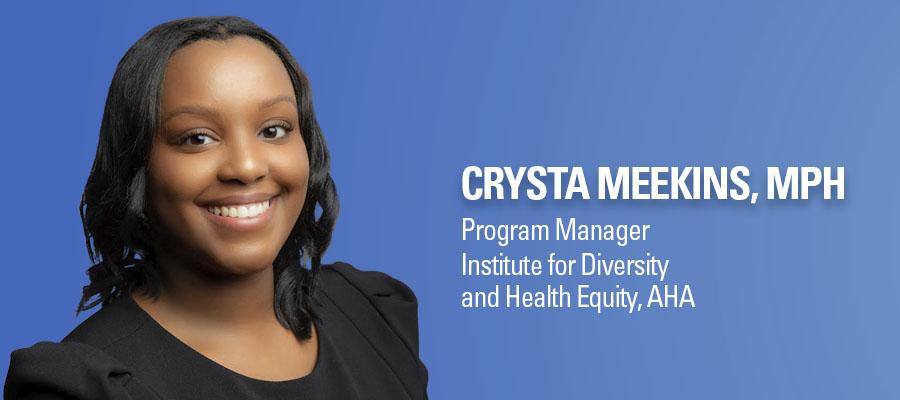Black Maternal Health Requires a Unified Approach

The statistics around Black maternal health in the U.S. remain grim. Data from the Centers for Disease Control and Prevention show that Black women are two-to-three times more likely to suffer pregnancy-related deaths than their white counterparts, with most maternal deaths being preventable. This disparate outcome across racial and ethnic groups is of grave concern to the AHA and counter to the organization’s vision of “a just society of healthy communities, where all individuals reach their highest potential for health.” Maternal health is a high priority for the AHA.
In service of this mission, AHA and its Institute for Diversity and Health Equity at the 38th National Association of Health Services Executives (N.A.H.S.E.) Annual Education Conference in Atlanta hosted Understanding Bias in Black Maternal Health, which included a screening of “Toxic: A Black Woman’s Story,” a short educational film to start the conversation about the toxic stress and microaggressions Black women face.
After attendees watched “Toxic," they engaged in a facilitated discussion, led by Patrice Walker, M.D., chief medical officer, Atrium Health Navicent, to understand the negative impact of racial inequities on Black mothers and their mental health, families and birth outcomes. I had the pleasure to moderate a panel discussion with three dedicated health care leaders, Walker, Kiwita Phillips, M.D., from Grady Memorial Hospital, and Patricia Prime, R.N., owner of Prime BabyTime Consulting Doula Services and executive director of It Takes a Village – Maternal Health Expo Inc., on ways health care organizations can provide equitable, culturally competent and interdisciplinary maternal care to women of color from all walks of life.
Here are four takeaways from these discussions:
Accountability is a big deal.
It is important to have accountability within hospitals and health systems for those who are taking care of patients. Internal accountability reinforces adherence to ethical and professional standards in maternal health care. Organizations should ensure that every mother that walks into the hospital receives the same patient-centered care and that treatment options are equitable and culturally competent.
“We have to hold our clinicians accountable,” commented Dr. Walker. That does not mean that a bad outcome equates to being a bad doctor, she clarified. “However, there are all kinds of algorithms and standards of care that should be utilized. And we need to make sure that our clinicians are utilizing those things,” she concluded.
Teams that work best are teams that work together.
Cohesiveness is an essential component of an interdisciplinary care team. Each member of the interdisciplinary care team should understand the role they play and how each of those relationships need to work to provide the best patient-centered care. Recognizing roles and responsibilities within a team is integral in holding each other accountable.
“We think a lot about making sure our team is one, where all the cylinders are theoretically clicking, and all of the people are in place doing their piece, said Dr. Phillips, who trains residents from Grady Memorial Hospital and Morehouse. “Having people understand their roles and having people understand that the thing that they do is not the only thing, is always very important,” she added.
The fight cannot just be fought within the four walls of the hospital.
Health care systems cannot do this work by themselves. Community partnerships play a vital role in maternal health, especially for ensuring the well-being of mothers and babies. Partnerships expand the reach beyond what clinicians are able to do solely within the hospital. There are resources available within communities.
“We cannot do it all ourselves,” commented Dr. Walker. “We have to look within our communities and organizations like the AHA and IFDHE that have resources; we need to leverage those resources because we all have bottom lines and budgets, so we can’t do it all. But we need to let the others do what they do.”
“But those of us who are in a powerful position, understanding how we decrease power to collaborate better is something that we all have to do,” Dr. Phillips added. “And when we do it best, I think we get the best outcomes.”
View AHA’s Best Practices for Equitable Maternal Care for practical ways health care organizations can foster equitable practices in maternal care, individually and systemically.
Equip yourself and your organization with the right resources.
It is essential that we educate ourselves and health care professionals on the root causes of maternal health inequities and train to be equipped to tackle them head on.
For example, health care organizations can purchase “Toxic: A Black Woman’s Story,” as a tool to collectively discuss the microaggressions Black women face. Non-profit AHA-member hospitals through Dec. 31 can purchase the film for only $375. AHA has hosted multiple screenings and used the film to spark robust discussions with a wide array of organizations; what we’ve learned during this process has been distilled into action steps that health care organizations can take to move the needle forward on maternal health equity. This serves as a small way to start meaningful conversations with internal staff, external stakeholders and community partners.
Health care organizations also can invest in the March of Dimes’ implicit bias training, “Awareness to Action: Dismantling Bias in Maternal and Infant Healthcare™. The training enables one to recognize and remedy implicit bias with goal-oriented action steps.
Addressing the complex and multifaceted challenges to Black maternal health in the U.S. requires a comprehensive approach that involves not only improvements within the health care system but also broader societal changes to tackle systemic inequalities and promote health equity for all communities. With these four reminders in mind, we must continue to embark, learn and grow in this journey.
Crysta Meekins, MPH, is a program manager for AHA’s Institute for Diversity and Health Equity.

